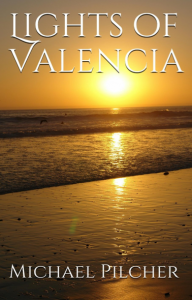
Lights of Valencia is a treasure on various levels. The fact it is written by a young man who has lived in Valencia and had similar experiences means that the writing comes from first-hand reflections crafted into fiction. This kind of book will always be sturdier and deeper than those pieced together through third-hand research, and it makes all the difference. “Write what you know” rings true here, and the fact that I live in Spain myself, with good friends in Valencia, I was impressed with Pilcher’s ability to capture the essence of Valencia and Fallas, (pronounced something like “Fires”, quite rightly, as it is the loudest night in Spain as fireworks and bonfires are strewn across the streets) as well as what it is to be an ex-pat.
Having written a book about Spanish culture myself from a British point of view, I could relate to Pilcher’s experiences and the attempts of escapsim that many ex-pats make, usually finding that the part of themselves they tried so hard to leave behind only becomes more apparent in a foreign land. There is a pang of Jason Webster’s novel, Duende here – a young man discovering himself in a land full of history and the issues of fitting in and dealing with language and culture.
There are a couple of small issues in style. Pilcher constantly writes short sentences, that after a while, take on a punctuated rhythm in the reading, where longer, more prose-like flows may have served him well for the mechanics of taking in his story. The construction of paragraphs is sometimes in need of an edit, and habits such as repeating character’s names too often sometimes grate. I do also wonder if the book might have benefited from being written in the first person from Oliver’s point of view to intensify his experiences and emotions. But these are tiny things that can be overcome to enjoy the book.
The cover needs some work, it’s true, but it does capture something of the beach life possible in Valencia. However, it may be more fitting to look into getting a Fallas-inspired cover, something more young and dynamic for this book, as it’s definitely more appealing for younger expats and readers as well as romance fans. A change of cover might help the book stand out for sales.
But overall, what matters in this book is the detail. Beautiful descriptions of landscapes, especially the coastlines, and local custom create wonderful images in the mind, as a true expat book should. What really works in this book are the backdrops, carefully decorated with Spanish/Valencian colloquialisms to bring everything into focus. The story is carefully cast across this writing, and ties the work together.
It would be to Pilcher’s advantage to pitch this book square at the expat market in Spain as well as those hispanophiles flourishing the world over, as this kind of tale is bound to garner support from such corners. When you read a book like this, you see it in color, depth and poetry, and that’s why books like this need to exist.
Review Overview
Design
Content
Editing
Get an Editorial Review | Get Amazon Sales & Reviews | Get Edited | Get Beta Readers | Enter the SPR Book Awards | Other Marketing Services






















Leave A Comment